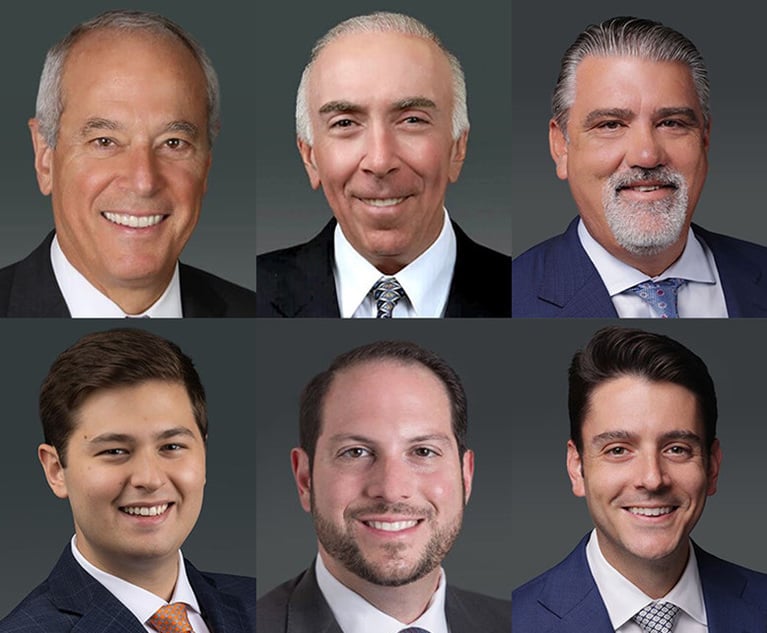Florida First District Court of Appeal Retreats from Ortiz
Thankfully, in the recent decision of American Airlines Grp. v. Lopez, the First District Court of Appeals has decided to retreat from the Ortiz decision in favor of applying a traditional statutory of limitations analysis.
July 11, 2024 at 11:55 AM
3 minute read
 Credit: Pixel-Shot/Adobe Stock
Credit: Pixel-Shot/Adobe Stock It is paramount that a legal practitioner and adjuster be able to determine whether a petition for benefits was timely filed, or if the petition for benefits falls outside the time limit for filing. Previously, the general rule was that a claimant had two years from the date of the accident or one year from the last provision of benefits, whichever is later, to file a Petition for Benefits in Florida. Currently, Florida's statute of limitations for workers' compensation cases is codified at F.S. 440.19 (1) and (2).
 Michael O'Donnell, associate with Vaughan McLean. Courtesy photo
Michael O'Donnell, associate with Vaughan McLean. Courtesy photo In 2023 a Florida court decided to modify the well-established rule in the case of Ortiz v. Winn-Dixie, Inc. 361 So. 3d 889 (Fla. 1st DCA (2023). In Ortiz, the court determined that the previous two-year limitations period, which was previously not subject to tolling, could be tolled. The application of this new legal standard tended to be problematic for practitioners and adjusters alike as it was not entirely clear how to apply the new two-year tolling period on a case-by-case basis. When the statute of limitation issues were analyzed at trial by the judges the resulting rulings did not always appear entirely consistent with one another. Thankfully, in the recent decision of American Airlines Grp. v. Lopez (1D2023-0379) the First District Court of Appeals has decided to retreat from the Ortiz decision in favor of applying a traditional statutory of limitations analysis.
This content has been archived. It is available through our partners, LexisNexis® and Bloomberg Law.
To view this content, please continue to their sites.
Not a Lexis Subscriber?
Subscribe Now
Not a Bloomberg Law Subscriber?
Subscribe Now
NOT FOR REPRINT
© 2025 ALM Global, LLC, All Rights Reserved. Request academic re-use from www.copyright.com. All other uses, submit a request to [email protected]. For more information visit Asset & Logo Licensing.
You Might Like
View All
'Black Box Evidence is Bulletproof': South Florida Attorneys Obtain $1 Million Settlement
2 minute read
'All About Case Selection': Small But Mighty Miami Firm Reflects on Decades of Success

Miami Firm Reaches $1.9M Settlement for Protester's Injuries, Pursues Class Action for Others
Trending Stories
- 1Munger, Gibson Dunn Billed $63 Million to Snap in 2024
- 2January Petitions Press High Court on Guns, Birth Certificate Sex Classifications
- 3'A Waste of Your Time': Practice Tips From Judges in the Oakland Federal Courthouse
- 4Judge Extends Tom Girardi's Time in Prison Medical Facility to Feb. 20
- 5Supreme Court Denies Trump's Request to Pause Pending Environmental Cases
Who Got The Work
J. Brugh Lower of Gibbons has entered an appearance for industrial equipment supplier Devco Corporation in a pending trademark infringement lawsuit. The suit, accusing the defendant of selling knock-off Graco products, was filed Dec. 18 in New Jersey District Court by Rivkin Radler on behalf of Graco Inc. and Graco Minnesota. The case, assigned to U.S. District Judge Zahid N. Quraishi, is 3:24-cv-11294, Graco Inc. et al v. Devco Corporation.
Who Got The Work
Rebecca Maller-Stein and Kent A. Yalowitz of Arnold & Porter Kaye Scholer have entered their appearances for Hanaco Venture Capital and its executives, Lior Prosor and David Frankel, in a pending securities lawsuit. The action, filed on Dec. 24 in New York Southern District Court by Zell, Aron & Co. on behalf of Goldeneye Advisors, accuses the defendants of negligently and fraudulently managing the plaintiff's $1 million investment. The case, assigned to U.S. District Judge Vernon S. Broderick, is 1:24-cv-09918, Goldeneye Advisors, LLC v. Hanaco Venture Capital, Ltd. et al.
Who Got The Work
Attorneys from A&O Shearman has stepped in as defense counsel for Toronto-Dominion Bank and other defendants in a pending securities class action. The suit, filed Dec. 11 in New York Southern District Court by Bleichmar Fonti & Auld, accuses the defendants of concealing the bank's 'pervasive' deficiencies in regards to its compliance with the Bank Secrecy Act and the quality of its anti-money laundering controls. The case, assigned to U.S. District Judge Arun Subramanian, is 1:24-cv-09445, Gonzalez v. The Toronto-Dominion Bank et al.
Who Got The Work
Crown Castle International, a Pennsylvania company providing shared communications infrastructure, has turned to Luke D. Wolf of Gordon Rees Scully Mansukhani to fend off a pending breach-of-contract lawsuit. The court action, filed Nov. 25 in Michigan Eastern District Court by Hooper Hathaway PC on behalf of The Town Residences LLC, accuses Crown Castle of failing to transfer approximately $30,000 in utility payments from T-Mobile in breach of a roof-top lease and assignment agreement. The case, assigned to U.S. District Judge Susan K. Declercq, is 2:24-cv-13131, The Town Residences LLC v. T-Mobile US, Inc. et al.
Who Got The Work
Wilfred P. Coronato and Daniel M. Schwartz of McCarter & English have stepped in as defense counsel to Electrolux Home Products Inc. in a pending product liability lawsuit. The court action, filed Nov. 26 in New York Eastern District Court by Poulos Lopiccolo PC and Nagel Rice LLP on behalf of David Stern, alleges that the defendant's refrigerators’ drawers and shelving repeatedly break and fall apart within months after purchase. The case, assigned to U.S. District Judge Joan M. Azrack, is 2:24-cv-08204, Stern v. Electrolux Home Products, Inc.
Featured Firms
Law Offices of Gary Martin Hays & Associates, P.C.
(470) 294-1674
Law Offices of Mark E. Salomone
(857) 444-6468
Smith & Hassler
(713) 739-1250







